The Nomadic Life
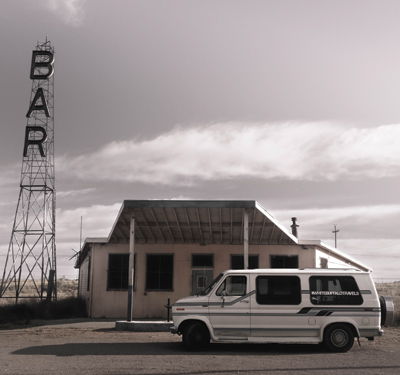 ALL PHOTOS COURTESY PAKI O'MEARA
Top Image: O'Meara savors a
quiet morning at
Thompson Chain of
Lakes in Montana. Above: O'Meara began his travels in a 1991 Ford Econoline
conversion van called the White Buffaloónamed after the
majestic beast that stands apart from the herd. When that
broke down, he began flying overseas for adventures farther
afield.
ALL PHOTOS COURTESY PAKI O'MEARA
Top Image: O'Meara savors a
quiet morning at
Thompson Chain of
Lakes in Montana. Above: O'Meara began his travels in a 1991 Ford Econoline
conversion van called the White Buffaloónamed after the
majestic beast that stands apart from the herd. When that
broke down, he began flying overseas for adventures farther
afield.
Most know Paki O'Meara (10BA) as the Hawkeye football walk-on from Cedar Rapids whose perseverance landed him a scholarship as a special teams standout and running back. But the local letter winner has a worldlier side. Encouraged by his Samoan mother and anthropology professor father, O'Meara has always held a natural curiosity for the world, which he explored at the UI as an anthropology major. It was only fitting, then, that less than six months after his December 2010 graduation, O'Meara began life on the road. The Hawkeye globetrotter recently shared his travel reflections and stunning photography with Iowa Alumni Magazine via email from Australia's remote Margaret River region, where he's earning money as a chef after exploring Cambodia, Japan, and Taiwan.
What did you learn at the UI and with the Hawkeyes?
One memory that always stands out in my mind is walking out at Beaver Stadium in 2009 to play Penn State. It was a night game, and Penn State opted for a ďwhite-out.Ē It was so loud underneath the stadium, the whole place was shaking; I felt like a gladiator about to step foot into the Colosseum in Rome. The first play of the game, Penn State had a long pass for a touchdown and the place erupted. Nobody on our team got nervous; we never doubted that we would win. We dug our cleats in and went on to win decisively. It was the defining moment of our season, but that game was won long before that. You knew that your brothers wouldnít let you down, and you learn a lot about camaraderie that way. You learn trust and how to fight against the odds.
Experiences like that continue to serve me every day, and I am so thankful for it. All those long days in the offseason, all the failures, they make you into someone who canít be broken. It is a bit surreal to think back on memories like that because they are so long ago. It makes me think about my friends and how much I miss everyone back home.
When did you first catch the travel bug, and what do you love about traveling?
We moved around a lot while I was growing up. My background is not so typical in that my mother was born and raised on the island of Samoa. I was born in Wilmington, North Carolina, and, a few months later, we were on the move. We went to Samoa to stay with my motherís family for a while, then to Melbourne, Australia, as my dad had a job as a professor of anthropology at the University of Melbourne. We spent the next 10 years back and forth between the two countries before finally moving to Iowa, where my father is originally from, so I guess you could say that Iíve always had the travel bug.
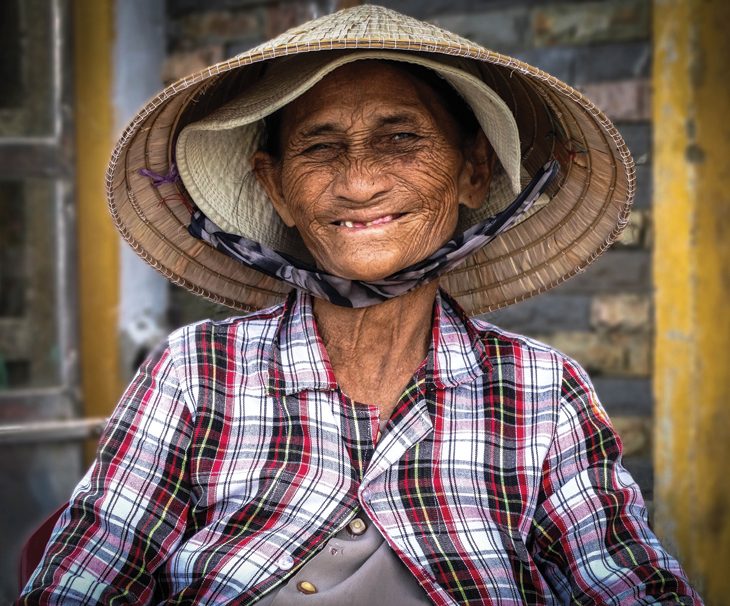 In Hoi An, Vietnam, O'Meara bought bananas from this woman
"full of life despite the hardships of arduous years of labor."
In Hoi An, Vietnam, O'Meara bought bananas from this woman
"full of life despite the hardships of arduous years of labor."
How did you learn photography, and what draws you to it?
I took a couple of intro photography courses in high school but didnít pick up a camera until years later, a couple years after I had started traveling. It was a passion that I had forgotten about during the busy football years, and it took the art of traveling to reawaken it in me. I was seeing so many interesting things along the way, and I could feel the experiences shaping me. I just wanted to share my outlook on the world with my friends and family back home, so I bought a camera and started reading about techniques. Time can often seem endless when you are on the road, and there is no teacher better than trial and error. It has taken a while, but I am getting better and more confident at it every day.
Why did you decide to live a nomadic lifestyle after graduation?
After graduation, I could feel myself slipping into a sort of mundane routine, the sort of sedentary lifestyle that I had always promised myself I wouldnít have. I was unhappy with it, and I knew the best thing would be to just pick up and leave. It was so exciting to take the first step.
Was it hard to drop everything and start traveling?
Taking the first step felt a bit like stepping off the edge of the known world. I was confident, but I didnít have any cheat sheet for what I was about to do, so I just needed to keep my wits about me and learn from the mistakes. The excitement always outweighed the fear; I just always think positively about what the next day could bring. Itís a rush to think about going to a place that you have never been, because you know that you will learn things about the world, people, and yourself and that you will be so much better for having those experiences. I think my friends always pegged me for this sort of life after college, and I am lucky enough to come from a very open family who encourages me at everything I do, no matter how ridiculous it may seem.
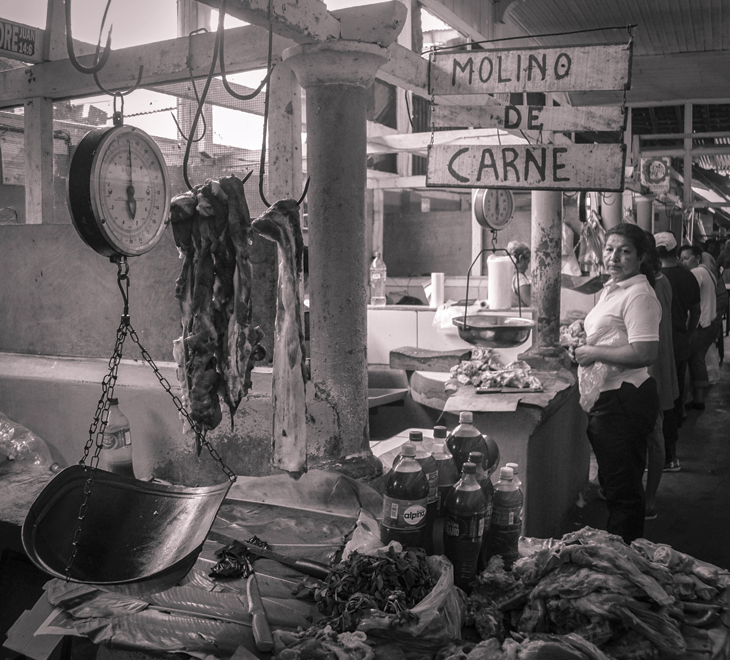 A woman sells meat
at the central market in
Granada, Nicaragua.
A woman sells meat
at the central market in
Granada, Nicaragua.
Whatís the significance of your Instagram name, White Buffalo Travels?
I just love the animal. White buffalos are big and majestic, and they look you in the eye. A white buffalo has a bit of mysticism around it, particularly in Native American lore; itís an ancient Lakota story. I like to think of it as going against the grain. A white buffalo is starkly different than the rest of the herd.
How many countries have you been to?
Iím not sure, but if I had to put a number on it, I would say itís around 50 countries.
Whatís your favorite place to travel?
I always feel a strong pull toward Costa Rica. I stayed there for a total of a year on two different occasions, working and enjoying life. Iíve made so many friends and so many memories there that it feels like a second home to me. I donít get so restless to move when I am there.
How do you find places to eat, sleep, and work?
I try to eat as local as I can while Iím on the road. I think food is a huge part of the overall experience of a place and culture. Food is engrained in people, so I try to eat as the people do, which is usually the cheapest option anyway: cooking local recipes or eating at cheap roadside stands. I have a tough stomach so Iím not fussy about trying strange things, although I have gotten very sick on several occasions.
Finding a place to sleep usually consists of checking hostels or cheap hotels depending on the country and how long I want to stay. Hostels have been great for making friends along the way from every different country that you can imagine. If I plan to stay for a while and the country is cheap, then I will opt for an apartment.
Finding work is very tricky. You always require a work visa which is either impossible to get or very tricky and expensive. However, there are ways to find ďvolunteerĒ positions if you just ask around at hostels, and you may even get a job that pays cash in hand. I have volunteered at hostels, waited tables, bartended, done manual labor, worked as a baker, and now I am working as a chef.
How long do you stay in each place, and how do you know itís time to move on?
When I first started to travel, I was too eager, too anxious, and I tended to move quickly to the next place. I have learned over the years that the real experience comes with spending an extended time there. I want to feel the place out like a local, meet people from the area, and get a routine down the same way that a local would. Itís nice to go through the same struggles, whether it is shopping for vegetables while living in Havana or going to the dentist in Cambodia. Itís the ordinary experiences that I have learned the most from. Itís time to move on when the visa expires or when I feel I have gotten too used to the routine.
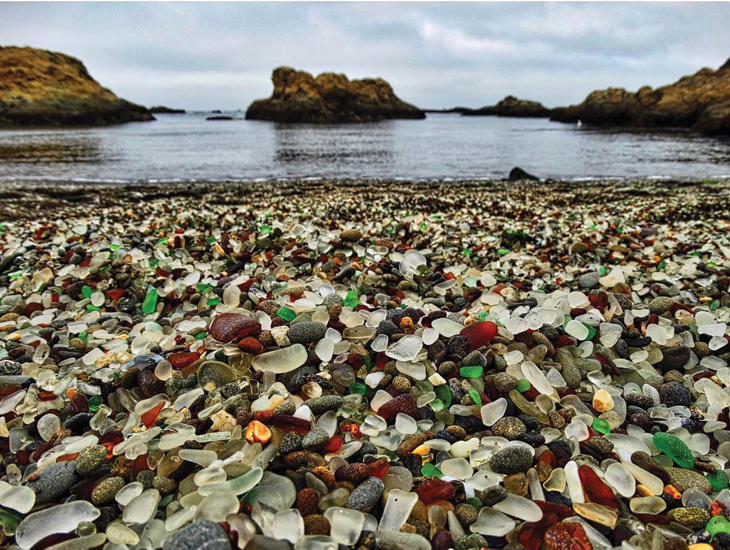 O'Meara draws attention
to environmental issues
he encounters at sites
such as Glass Beach in
Fort Bragg, California, which was
used as a dump site for
more than six decades.
He says, "Although
the pieces of glass will
eventually crumble
into sand, it is a telling
tale of how we have
relentlessly polluted our
Mother Earth."
O'Meara draws attention
to environmental issues
he encounters at sites
such as Glass Beach in
Fort Bragg, California, which was
used as a dump site for
more than six decades.
He says, "Although
the pieces of glass will
eventually crumble
into sand, it is a telling
tale of how we have
relentlessly polluted our
Mother Earth."
What have you learned from your travel experiences?
Mostly, I have learned about what makes people tick. Itís hard living in the bubble of the U.S. for years to comprehend the rest of the world, but as soon as you step outside, you realize the world is not such a different place and neither are the people in it. We are all subjected to certain political and social forces that direct our lives, but in the end, we all want the same things. We just don't get them. Iíve learned a great deal about compassion, kindness, reality, sympathy, human nature, and resilience. Iíve seen incredibly sad things, but Iíve also seen pure happiness from the simplest of things.
One more important thing I have learned from travel is that it should be selfish in the sense that you should do it for yourself, because it is an investment in who you are. You canít do it for anyone else, or it wonít be authentic enough to be worth the time. From that selfishness, you learn the most, and you get the great pleasure of sharing what you experience with everyone who may be curious about it and not have the opportunity to do the same. Your travels can make the world a smaller place, and thatís all we need it to be.
How do you raise awareness of humanitarian and conservation issues through your photography?
Iíd like my photos to speak for themselves. Whatever you see in the image should tell you something about yourself. I like to take photos of people mostly, and I like to make up my own stories about how their day might be going or what adversities have landed them in the position they are in. I want my images to make me think about the state of the world and the state of humanity, and itís not always so pretty. I think by seeing ourselves or our loved ones in other people, it can help us be better to each other and better to the planet.
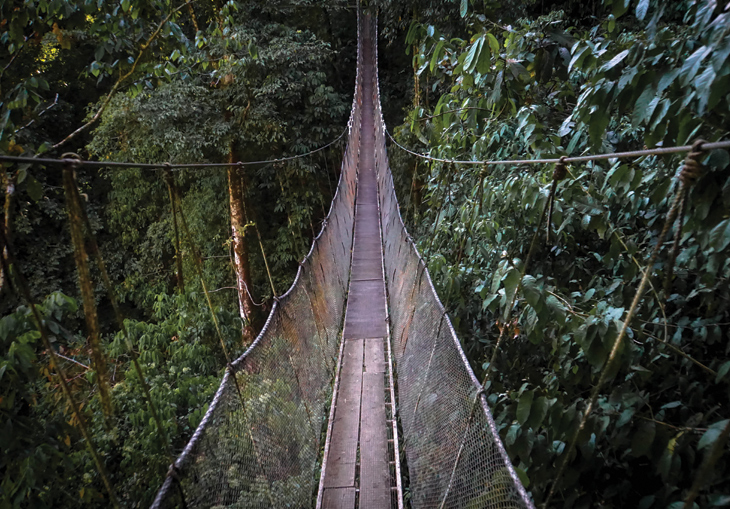 Costa Rica
Costa Rica
What inspires you?
People. I love hearing stories about other travelersí experiences, what theyíve done or what theyíve seen and how it changed them, how they have changed since they left their respective countries. I think itís inspiring to meet people who are open-minded and allow different perspectives to enter their life, so they can grow. I also love hearing stories from people who have grown up in the countries I am visitingóhow was their childhood and what challenges they face and how that was different to what I experienced growing up. Itís just fun, and I think of it as an investment in myself, because there is so much personal growth.
What advice do you have for people about this lifestyle?
My advice to someone who is curious about this lifestyle is that it is generally not a carefree one, no matter what you see on Instagram. My days are filled with constant challenges, whether itís money, transportation, or being alone in a new place where I donít speak the language. There is a lot of fear, but you learn that you can dig your way out of anything, and it gives you an incredible amount of confidence. The short version is that there will be many challenges, but you can rise to the occasion, and, when you do, the rewards are like nothing youíve ever experienced.
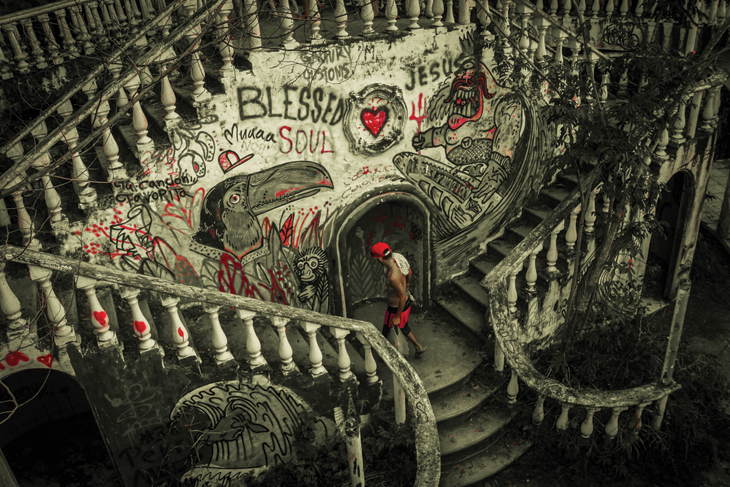 The once grand
entrance of an abandoned
restaurant in Puntarenas,
Costa Rica, has turned
into a haven for graffiti.
The once grand
entrance of an abandoned
restaurant in Puntarenas,
Costa Rica, has turned
into a haven for graffiti.
Whatís next?
I just want to keep on moving. I am noticing a trend in my travels of staying longer and longer in most of the places I visit. Maybe Iím getting old and Iíll want to settle down soon. Who knows?
